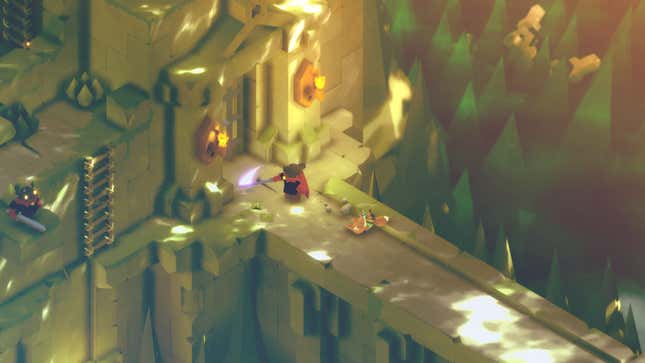Gorgeous Zelda-Like Tunic Is Exactly What I Needed Right Now (original) (raw)
In Tunic you wake up as a fox on a colorful, isometric shore. Walk for a little bit and you’ll find some monsters. Go in a cave and you’ll find a stick with which to fend them off. Venture a bit further and you’ll find a maze of rocks, broken bridges, and other obstacles to navigate in search of the next clue to what you’re doing in this lovely, twee little video game world. It’s simple and familiar and exactly the type of game I didn’t know I needed right now.
Suggested Reading
This Action Game Asks What If Ninja Gaiden Let Its Hair Down
- Off
- English
Suggested Reading
I hadn’t paid much attention to Tunic before it came out yesterday. I’d caught glimpses of it as they arose in indie showcases and on social media. It looked nice, but also like the sort of highly stylized, retro-channeling production I’d dipped in and out of dozens of times before. And it is. But also it’s much more. The second I booted up Tunic its bespoke look and introspective ambient soundtrack rushed over me like a fresh breeze on the first warm day of spring.
Tunic was created by Andrew Shouldice, and like a lot of predominantly solo indie projects it took a long time. He quit his job to work on Tunic fulltime back in 2015, when it was still called Secret Legend. He later hooked up with Adam Saltsman’s publishing label Finji for development and publishing support. Dustforce composer Lifeformed provided the music, and it was eventually renamed Tunic at the E3 2017 PC Gaming Show. Five years after that, it’s finally out on Xbox as a day-one Game Pass release.
The First 27 Minutes Of Tunic: Smol Fox, Big Adventure
The game has you explore, fight monsters, and collect shiny things like you would in a classic Zelda game. There are shrines you save at and ghosts of yourself you can reclaim lost loot from à la Dark Souls. Under the surface, though, it reminds me of 2012’s Fez by Polytron. That esoteric puzzle-platformer was an audio-visual feast built out of a world full of arcane puzzles. On the surface Tunic looks like a conventional dungeon delver, but based on my first couple hours playing, it feels much more like a moody puzzle game at its core.
In this regard your mileage may vary. Despite it garnering mostly positive reviews so far, there are also criticisms of its combat, which can feel sluggish, and of some of the Soulslike elements, which can get in the way of its more contemplative exploration. So far I’m really digging the mix, but there are certainly snags for people to get caught on.
For me it’s hitting at the perfect time. The release calendar has been relentless in the early part of 2022. I’ve tagged in and out of Dying Light 2, Horizon Forbidden West, Elden Ring, Destiny 2: The Witch Queen, and plenty of other stuff ranging from the revelatory (FAR: Changing Tides) to the busted (Babylon’s Fall). In many ways it’s been great. It’s also been sensory overload from grinding through quest logs or concentrating on not getting my ass kicked. As a result, _Tunic_’s minimalist beauty, calm mood, and evocative vibe are a welcome reprieve. Much more than just a palate cleanser, _Tunic_’s the gaming detox I didn’t even realize I needed until I started playing and immediately fell in love.

Image: Andrew Shouldice / Finji
Part of what I’m enjoying so much about Tunic now is the way it feels like a throwback to the early 2010s, when some indie developers were revolting against the enjoyable but loud, grim presentations of so many big commercial blockbusters that were chasing either Call of Duty or Grand Theft Auto. Despite its obvious influences and approachable trappings, you can still feel a tug of war within Tunic between the parts to which its creator allows you easy access and the ones you have to quietly work for.
Of course, games like Superbrothers: Sword & Sworcery EP, Fez, and Monument Valley ended up monopolizing the attention space for certain kinds of games in their own way. It has been a relief to see the stranglehold that a certain type of minimalist, retro indie aesthetic used to have on what gets published and talked about loosen its grip a bit. It’s been a long time since those games–my relationship with Superbrothers follow-up JETT: The Far Shore remains…fraught–and I’m ready for more.
There is a feeling coming out of the long, cold winter, when the sunlight lasts longer and the outside air is the same temperature as the inside air. It feels like each new day and the possibilities therein can extend beyond themselves uninterrupted. _Tunic_’s been giving me that sensation in the form of a game, and I’m enjoying the respite.